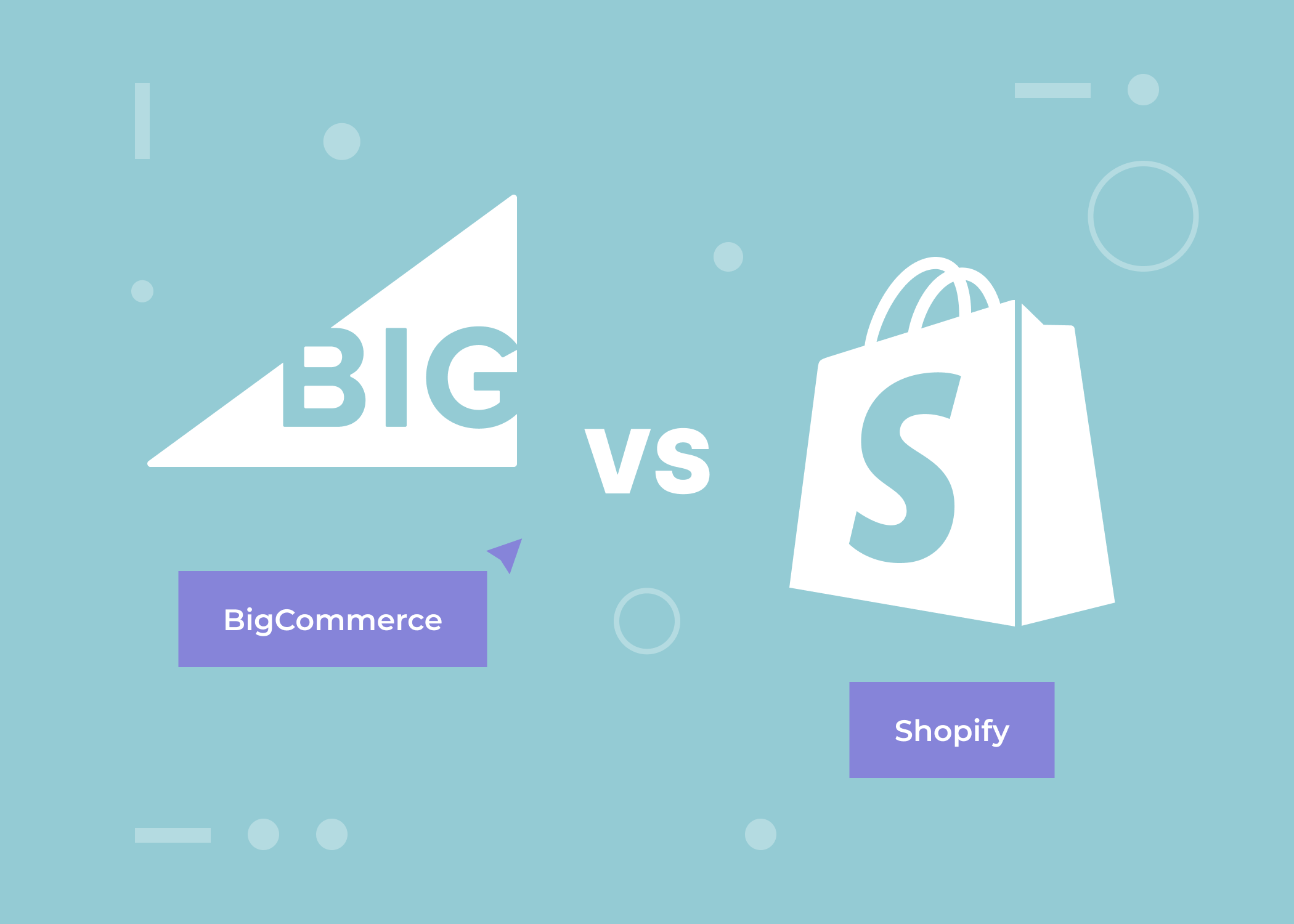Content
Magento vs Shopify Plus: Complete Guide
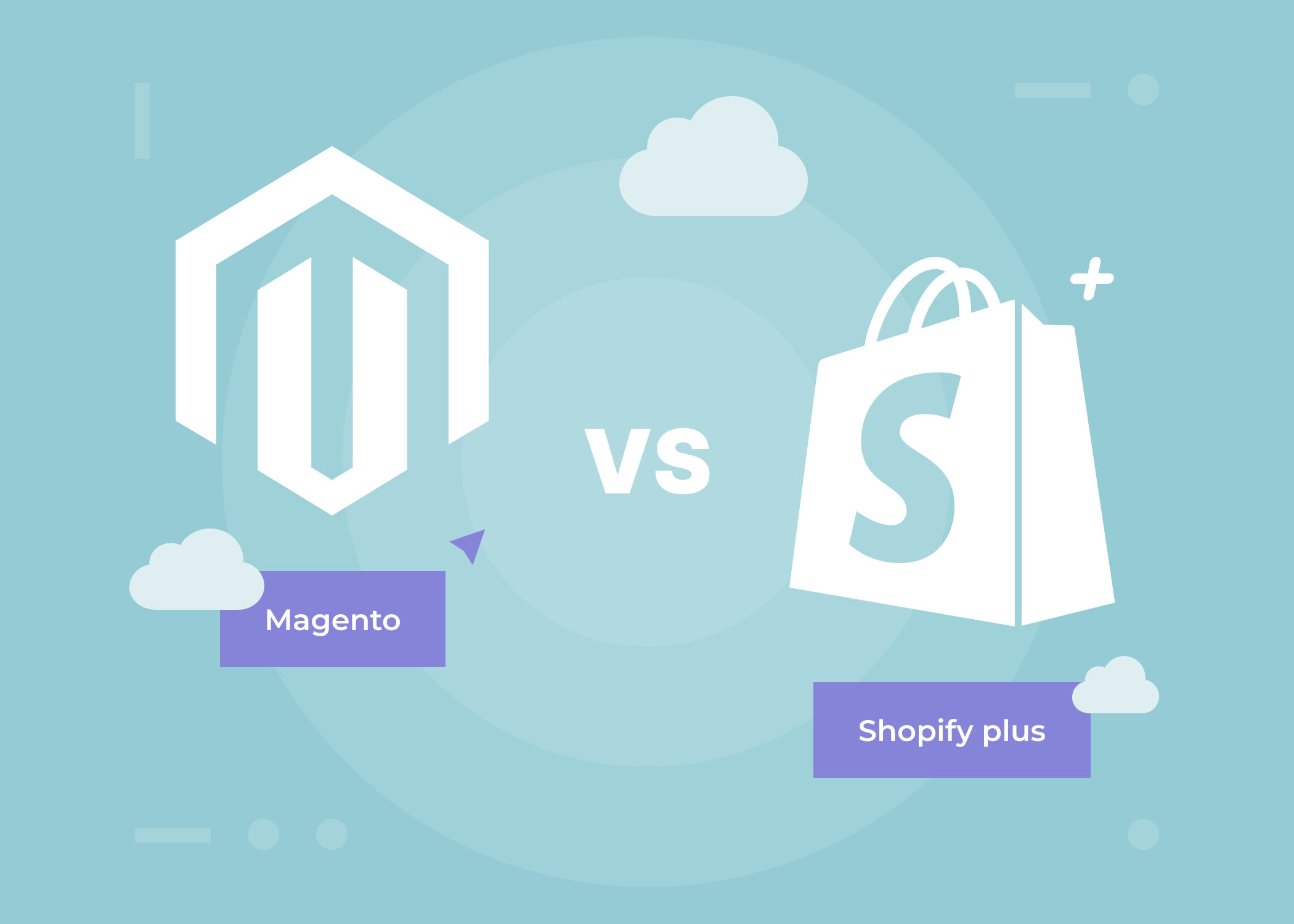
Time to read: 20 minutes
As more businesses switch to digital, the importance of reliable e-commerce platforms increases. Magento and Shopify Plus are two popular options for providing sophisticated features and scalability. But which one is better? In this complete guide, we’ll look at the key differences between Magento and Shopify Plus, so you can make an informed decision in 2023 and beyond. We’ll compare features, pricing, integration options, security, and more to help you decide which is the better platform for your business needs. So let’s get started!
What is Magento?
Magento is an open-source e-commerce platform that offers merchants a wide range of features and flexibility to build, manage, and customize their own online store. Magento has three different editions that cater to businesses of varying sizes: Magento Open Source (formerly Magento Community Edition), Magento Commerce (formerly Magento Enterprise Edition), and Magento Commerce Cloud (formerly Magento Enterprise Cloud Edition). Magento Open Source is the free version of Magento, while Magento Commerce and Magento Commerce Cloud offer more advanced features and require an annual subscription.
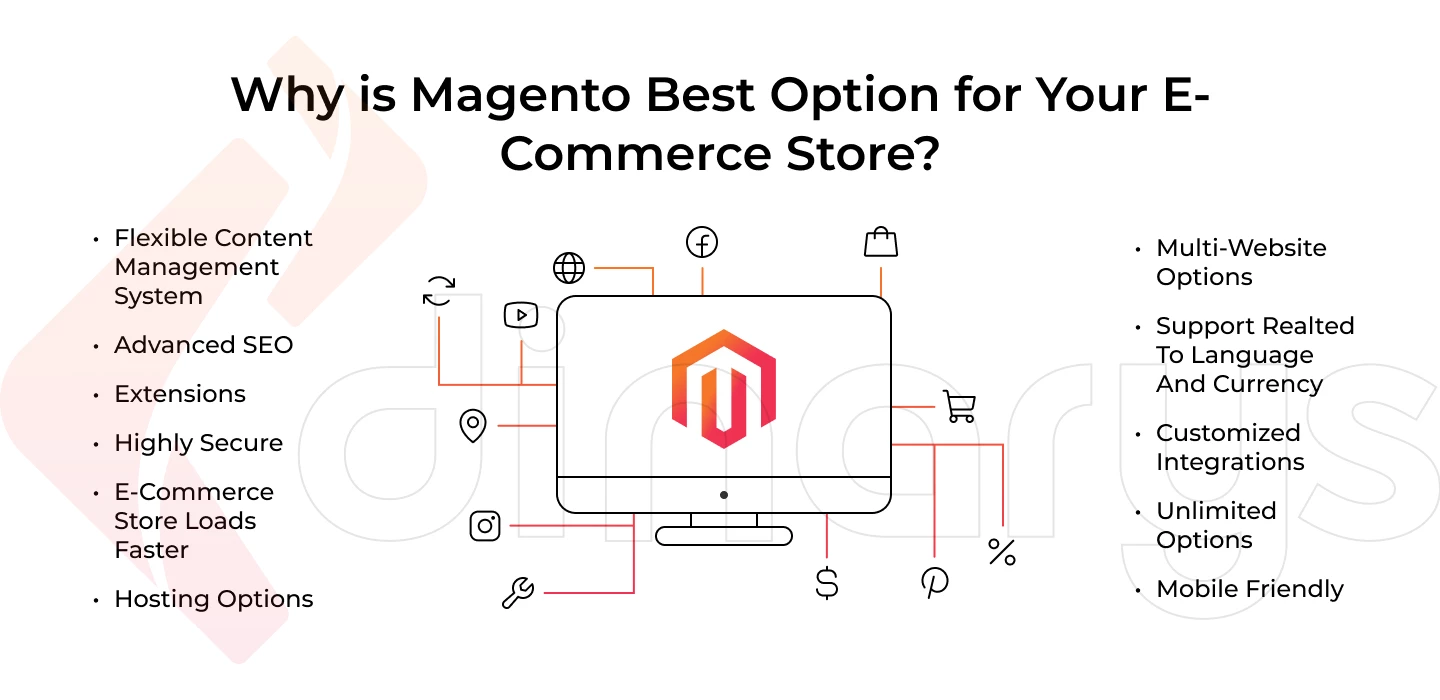
Magento's key features include customizability, scalability, multi-store support, mobile optimization, payment integration, marketing tools, and search engine optimization. Magento also offers an extensive library of extensions, so you can add additional functionality to your store. Magento is designed for large businesses that need a powerful e-commerce platform with advanced features and scalability but may require the help of a Magento developer due to its complexity.
Magento is now among TOP 10 most popular e-commerce platforms in the world. As of October 2022, Magento has a 0.9% market share of all websites that use known content management systems. Magento is downloaded nearly 5,000 times every day.
Lets talk about itHave a project in mind?
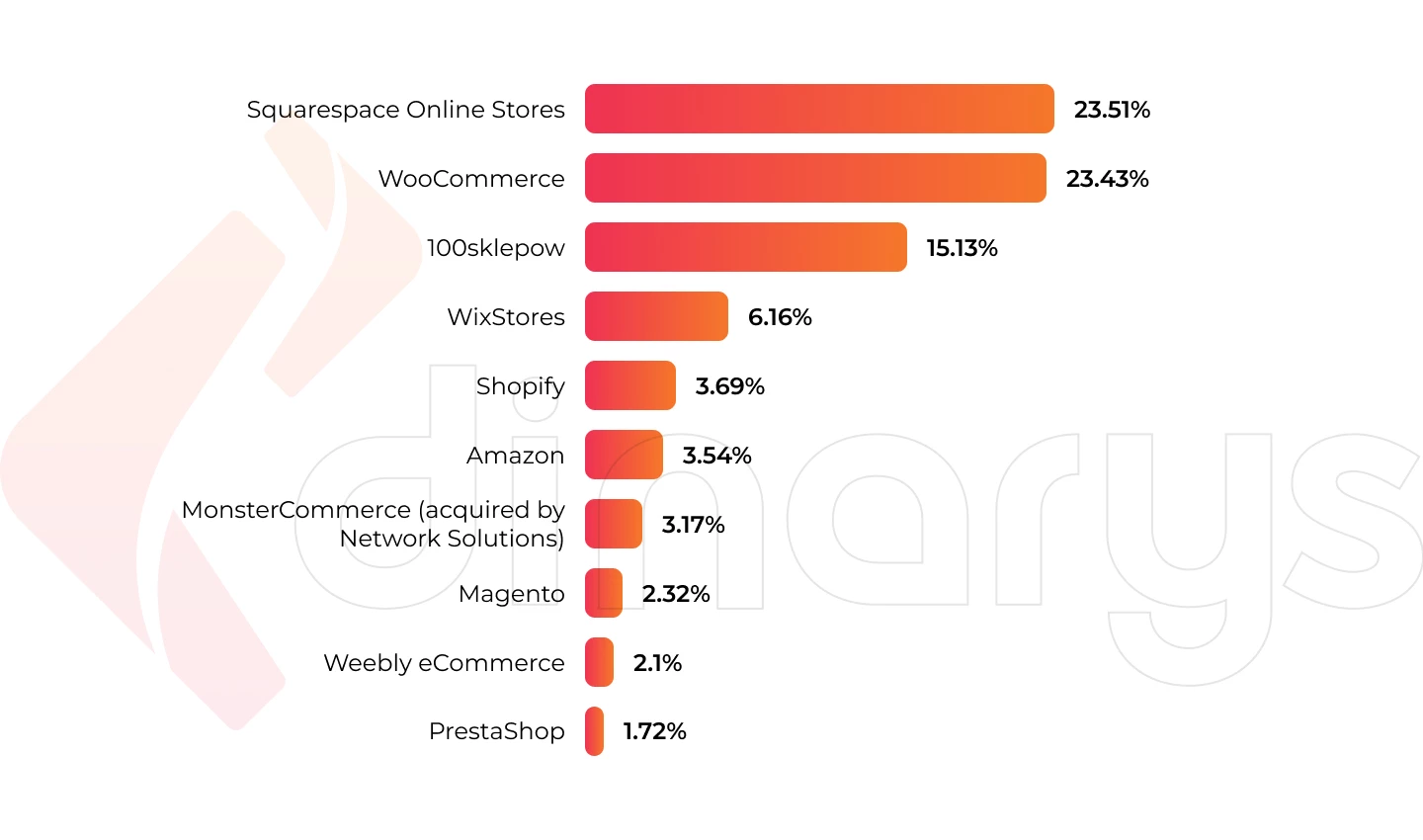
Read also: How to Build a Magento 2 Website. Best Tips by Dinarys
Pros and Cons of Magento
Magento gives businesses enormous flexibility and scalability when it comes to their online store. Magento has been around since 2007 and is the most popular choice for many medium-sized businesses. It offers two versions: Magento Open Source, which is free, and Magento Enterprise, which has more features and functionality but comes with a hefty price tag. Magento is popular because of its flexibility and scalability, however, Magento also has some drawbacks.
Pros of Magento:
Flexibility
Magento is highly customizable and allows businesses to tailor their store to match the look and feel of their brand. Magento also offers various modules and plugins that can be added to increase the functionality of a Magento store.
Scalability
Magento is built on an open-source architecture which makes it easy to scale as your business grows. Magento's multiple servers allow businesses to manage high traffic and order loads with ease.
Security
Magento is a secure platform that meets the highest security standards. Magento also offers various features to help protect customers from fraudulent activities such as data encryption and password protection.
Open Source
Magento is an open-source platform that allows developers and designers to modify the code at their own pace. Magento also offers various community forums for support and collaboration.
Search engine optimization Magento is SEO friendly and offers various features to help businesses optimize their online store for better visibility.
Magento Connect
Magento Connect is Magento's marketplace that allows businesses to find and install extensions, themes, and other modules to enhance their Magento store.
Magento Enterprise vs Magento Commerce
Magento offers two versions, Magento Enterprise, and Magento Commerce. Magento Enterprise is the more expensive option but offers additional features such as customer segmentation, advanced reporting, and advanced marketing tools. Magento Commerce is a cheaper but less feature-rich option.
Cons of Magento:
Cost
Magento Enterprise can be costly for small businesses. Magento also requires ongoing maintenance costs to keep the platform running smoothly.
Complexity
Magento is a complex platform that requires some technical knowledge to manage. Magento also requires developers for customizations and extensions, which can be costly.
Performance
Magento can be slow and require ongoing optimization for better performance. Magento Enterprise users also report performance issues when dealing with high traffic or order loads.
Support
Magento does not offer direct customer support, which can make it difficult to troubleshoot problems. Magento users must rely on the Magento community forums or third-party resources for help.
Anyway, Magento is a powerful e-commerce platform that can give businesses the flexibility and scalability they need for their online store, but it's important to weigh the pros and cons before making any decisions. Magento Enterprise vs Magento Commerce is an especially important factor to consider when comparing Magento with other solutions such as Shopify Plus. Be sure to compare Shopify Plus vs Magento Commerce to find the right solution for your business.
Lets talk about itHave a project in mind?
What is Shopify Plus?
So, we've decided what Magento is and its main advantages and disadvantages. Let’s take a look at Shopify Plus, Magento's main competitor. Shopify Plus is the most advanced e-commerce platform of the Shopify family. According to statistics, 21,050 websites use Shopify Plus which includes location information, hosting data, and contact details.
It was designed with large and enterprise merchants in mind who need more scalability, reliability, performance, and flexibility than can be found in standard Shopify plans. It has all the features that Magento Enterprise Edition has, such as multi-store support, unlimited product catalogs, and advanced shipping options. It also offers a great range of customizable themes and plugins to help you build the perfect e-commerce website. Shopify Plus also has an extensive support network that provides merchants with 24/7 assistance and access to experienced developers who can help with any issues they may encounter. It’s clear that Shopify Plus is a great option for large and enterprise merchants looking to build an e-commerce website.
Among the main features that Shopify Plus provides:
- Unlimited products, sales, and orders
- A custom checkout process tailored to your needs
- Advanced analytics and reporting
- Ability to integrate with third-party solutions such as ERP systems and POS
- 24/7 support from Shopify Plus’s merchant success team
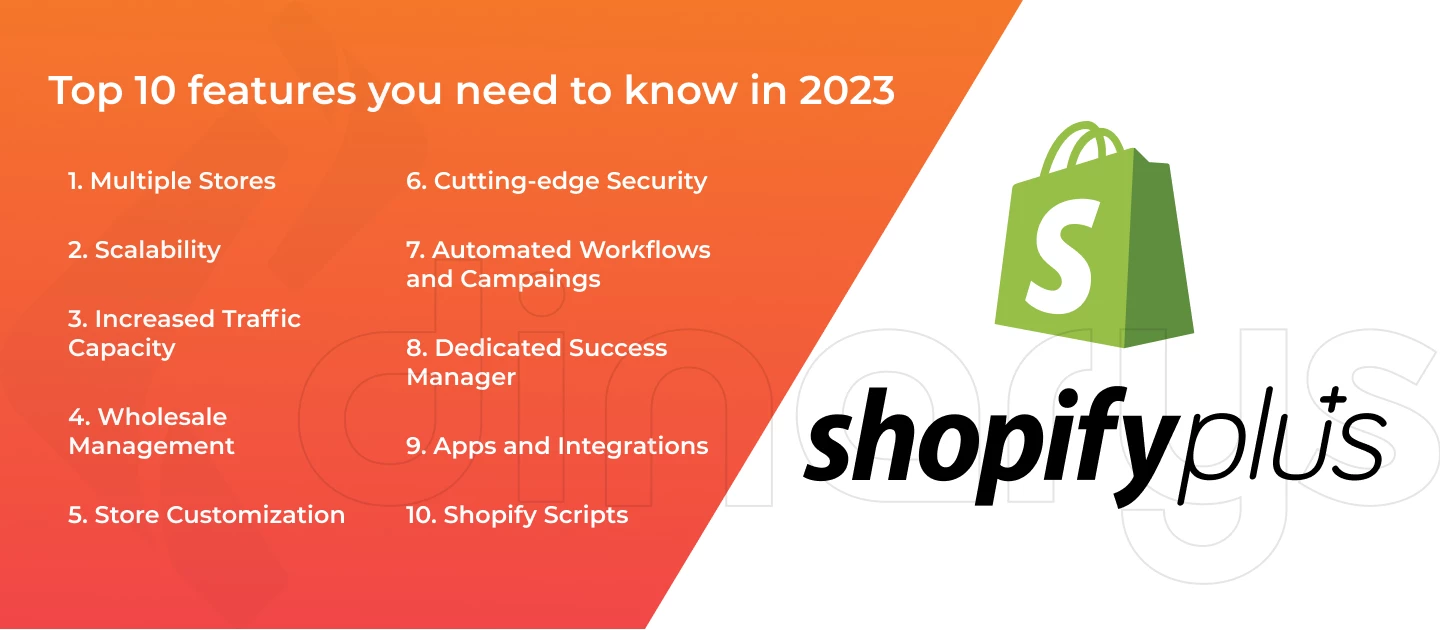
With these features and benefits, it is easy to see why Shopify Plus is the top choice for large and enterprise merchants. So if you’re looking for a powerful and scalable ecommerce platform, then Shopify Plus should be at the top of your list. With its advanced features and user-friendly experience, it can help your business grow and expand in no time. Shopify plus development company Dinarys can help you maximize your e-commerce potential and reach out to a wider audience. So don’t wait, get the best e-commerce solution for your business today!
Pros and Cons of Shopify Plus
Shopify Plus is a great option for large and enterprise merchants, but there are a few pros and cons to consider before making the switch.
Shopify Plus Pros:
- Shopify Plus offers a great range of features and support to enable merchants to quickly and easily create their stores.
- It also includes an intuitive user interface that makes it easy for merchants to manage their stores, as well as access advanced analytics and reporting capabilities.
- Shopify Plus offers 24/7 support from an experienced team.
- It has a number of customizable themes and plugins to help merchants create the perfect e-commerce website.
Shopify Plus Cons:
- Shopify Plus is more expensive than other e-commerce platforms, such as Magento.
- It does not offer as many features as some of its competitors, such as Magento.
- It is not suitable for small businesses that are just starting out and do not need the advanced features of Shopify Plus.
- Some third-party integrations may be limited or unavailable on Shopify Plus.
Overall, Shopify Plus is an excellent choice for large and enterprise merchants looking to create an e-commerce website. With its advanced features and user-friendly experience, it can help your business grow and expand in no time. It is worth considering if you are looking for an e-commerce platform that offers scalability, reliability, performance, and flexibility. While it may not be suitable for those just starting out, Shopify Plus is a great platform to invest in if you are an experienced store owner looking for an advanced e-commerce solution. With its range of features and 24/7 support, Shopify Plus can give you the upper hand in the competitive e-commerce market.
Lets talk about itHave a project in mind?
According to numerous studies, when it comes to e-commerce platforms, Shopify Plus and Magento remain at the top of the list. As digital commerce continues to grow more sophisticated, these two giants have seen an increase in their popularity as they offer secure, reliable solutions that meet a wide range of needs. Let's make a comparison between Shopify Plus vs Magento to see which one best suits your particular needs.
Pricing
Both Shopify Plus and Magento have similar pricing plans that are based on usage. However, the main difference lies in their subscription models: Magento offers an Enterprise Edition for businesses with high-volume sales and complex customizations; while Shopify Plus is a fully hosted solution that eliminates the need to invest in expensive hosting solutions or software licensing.
Shopify Plus pricing plans start at $2,000/month, while Magento Enterprise Edition plans start at $15,550/year. However, both platforms offer similar features and functionality, so the price you pay will ultimately depend on your specific needs and requirements.

When it comes to enterprise e-commerce platforms, Magento is often considered the more cost-effective option due to its flexible pricing plans and lower upfront costs. However, Shopify Plus is an appealing choice for businesses looking to launch quickly with minimal risk. Both platforms offer comprehensive features and customization options that make them suitable for large-scale businesses.
Magento and Shopify Plus have similar costs overall, but the important distinction lies in the subscription model. Depending on your business’s specific e-commerce needs, you may find that one option is more cost-effective than the other. Ultimately, it’s important to consider both solutions before making a decision.
Features and Capabilities
When it comes to features, Magento offers more flexibility than Shopify Plus. For example, Magento allows users to customize their stores easily, with options for creating custom forms and integrations that are not available on Shopify Plus. Additionally, Magento also offers a range of powerful marketing tools such as targeted email campaigns, loyalty programs, and integrations with Google Analytics & AdWords.
On the other hand, one of Shopify Plus’s main advantages is its scalability. Businesses can quickly and easily scale up their store to accommodate more customers and products, without any additional development or coding required. Shopify Plus also offers a range of built-in payment solutions, making it easier for customers to purchase from your store quickly and securely.
In terms of capabilities, both platforms are capable of handling large transactions and eCommerce stores. However, Magento has the edge when it comes to scalability and customizability, as well as marketing and analytics tools. Shopify Plus is more user-friendly, making it easier for businesses to set up their store quickly and efficiently.
Ultimately, the decision between Magento and Shopify Plus depends on your business’s specific needs. If you are looking for a highly customizable platform with powerful marketing tools, then Magento is the best choice. However, if scalability and ease of use are more important to you, then Shopify Plus may be the better option. Whichever platform you choose, both offer a range of features and capabilities that will help your business succeed.

Add-ons, extensions, integrations, and apps
Shopify Plus and Magento offer similar choices when it comes to add-ons, extensions, integrations, and apps. Both platforms allow users to easily customise their store's features and functions by integrating third-party software solutions.
When comparing Shopify Plus with Magento for add-ons, both offer a variety of options for users to choose from. Shopify Plus offers a wide selection of add-ons, which can be quickly and easily installed through the Shopify App Store. These add-ons are designed to provide users with additional features and capabilities that make their store more powerful and efficient.
In comparison, Magento also provides a variety of extensions for users to choose from. These extensions can be quickly and easily installed through the Magento Marketplace. But unlike Shopify Plus, the selection of available extensions may not always meet all users’ needs, which could require more time to find an appropriate solution.
When it comes to integrations, both Shopify Plus and Magento provide a variety of options for users to choose from. Shopify Plus offers a wide selection of integrations through its App Store, including popular solutions such as MailChimp and Google Analytics. Magento also provides a variety of integrations that can be installed directly from the Magento Marketplace.
Finally, when it comes to apps, both Shopify Plus vs Magento offers a variety of options. Shopify Plus provides users with access to their App Store, which contains a wide selection of apps that can be quickly and easily installed. On the other hand, Magento has its own app store as well, but it offers fewer options than Shopify Plus.
In conclusion, both Shopify Plus and Magento offer a variety of add-ons, extensions, integrations, and apps for users to choose from. However, Shopify Plus tends to be better suited for those who want the convenience of quickly installing the most popular solutions into their store. For those looking for more niche solutions or customizations, Magento is likely a better option due to its larger selection of extensions and integrations. Ultimately, the best solution will depend on the individual needs of each store owner.
No matter which platform you choose, adding add-ons, extensions, integrations and apps is a great way to customise and enhance your store's features and capabilities. By taking advantage of these solutions, you can ensure that your store is as powerful, efficient, and successful as possible.
How to Choose Between Shopify Plus and Magento?
So let's sum up the key points when deciding which eCommerce platform is best for your business - Shopify Plus or Magento.
First, consider the size and complexity of your store. Shopify Plus offers a much simpler setup than Magento, so if you're just starting out with an online business and want to launch quickly, it could be the better option. On the other hand, if you already have an established store with a large catalogue of products and require more customization options, Magento may be better suited for your needs.
Second, consider your technical abilities. If you are comfortable coding then Magento will likely provide the most flexibility in terms of customising your store. However, if you lack coding skills, then Shopify Plus may be easier to use with its drag-and-drop store builder and an array of app integrations.
Third, evaluate your budget. If money is an issue, then Shopify Plus could offer significant cost savings compared to Magento. However, as more features are added to the store, the cost of Shopify Plus may increase significantly.
Finally, assess your long-term objectives. If you want to expand further in the future and add more features, Magento could offer greater scalability and flexibility. On the other hand, if you plan on staying small or growing slowly over time then Shopify Plus may provide better value.
The choice between Shopify Plus and Magento comes down to your individual business requirements. Consider all factors carefully before making a decision, and you'll be sure to find the perfect e-commerce platform for your store.
Let's summarise all the main differences again with a table:

Read more in our blog:
Bigcommerce vs Shopify vs Magento and Shopware - Which is Best in 2023
Migrate from BigCommerce to Shopify
Bottom Line
In conclusion, it’s clear to see that there are distinct differences between Magento vs Shopify Plus for 2023. Both platforms have unique features, strengths, and weaknesses that make them more suitable for different business models.
Whichever platform you decide to go with, it’s important to remember that the key will be to find a platform that best meets your needs and goals. With careful consideration of the differences between Magento vs Shopify Plus for 2023, you can make sure you make the right choice for your business. Dinarys can help you decide which platform is best for your store. Contact us today to discuss how we can help you make the most of either Magento or Shopify Plus. Our experienced developers can help you get the most out of your e-commerce store.
Let professionals meet your challenge
Our certified specialists will find the most optimal solution for your business.


